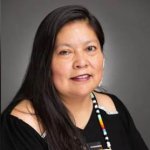To view the Spanish stream (el programa en español se transmitirá aqui):
https://bit.ly/3UMaPWo
Indigenous leadership is vitally important in addressing many of the great challenges we face as global citizens and as members of our own local communities. On December 1st, take part in a U.S. Department of State virtual program to hear Native American perspectives on key issues such as access to education, environmental stewardship, economic opportunity and mentoring the next generation of indigenous leaders.
Join our virtual discussion on Thursday, December 1st at 12:00 p.m. EST (Washington, DC time) where a panel of indigenous experts from a wide range of backgrounds will share their ideas and answer viewer questions.
The English language program will stream to this page. For the Spanish page, please visit: https://eca.state.gov/native-american-heritage-month-spanish
Native American Heritage Month is an opportunity to recognize indigenous peoples and how their diverse cultures enrich communities across the Americas and around the world, even in the face of historic discrimination that perpetuates to this day. As we strive for greater equality and pursue new opportunities, indigenous leadership and perspectives are more critically important than ever. White House Proclamation for Native American History Month.
SPEAKER BIOS:
Moderator:
 Karen Diver is the Senior Advisor for Native American Affairs at the University of Minnesota and was instrumental in implementing the system's new tuition waiver for enrolled members of Minnesota tribes. Prior to this role, she was President Obama's Special Assistant for Native American Affairs where she coordinated the Domestic Policy Council's policy towards tribal nations. From 2007-2015, she was the first female Chair of the Fond du Lac Band of Lake Superior Chippewa and chaired the state tribe's Finance Corporation. She is an expert on native nation building and governance, current affairs issues for Tribal Nations, and public policy. Bio
Karen Diver is the Senior Advisor for Native American Affairs at the University of Minnesota and was instrumental in implementing the system's new tuition waiver for enrolled members of Minnesota tribes. Prior to this role, she was President Obama's Special Assistant for Native American Affairs where she coordinated the Domestic Policy Council's policy towards tribal nations. From 2007-2015, she was the first female Chair of the Fond du Lac Band of Lake Superior Chippewa and chaired the state tribe's Finance Corporation. She is an expert on native nation building and governance, current affairs issues for Tribal Nations, and public policy. Bio
Panelists:
 Charity Qalutaq Blanchett is a member of the indigenous Alaskan Yup'ik tribe and founder of The Dipping Spoon Foundation, a non-profit whose mission is to cultivate the next generation of Black, indigenous, women of color, and girls to become culinary rock stars. The organization provides aspiring young chefs with culinary scholarships and creates access to inclusive Food-STEM programs with a focus on food science and food sovereignty. Blanchett can also speak about the importance of food culture to Native American communities and how it reflects their history, values, and stewardship of natural resources. Bio
Charity Qalutaq Blanchett is a member of the indigenous Alaskan Yup'ik tribe and founder of The Dipping Spoon Foundation, a non-profit whose mission is to cultivate the next generation of Black, indigenous, women of color, and girls to become culinary rock stars. The organization provides aspiring young chefs with culinary scholarships and creates access to inclusive Food-STEM programs with a focus on food science and food sovereignty. Blanchett can also speak about the importance of food culture to Native American communities and how it reflects their history, values, and stewardship of natural resources. Bio
 Michael Dockry is a registered member of the Citizen Potawatomi Nation and an assistant professor in the University of Minnesota's Department of Forest Resources. He is also an associate faculty member of the American Indian Studies Department and an Institute on the Environment Fellow. His research supports sustainable natural resource management research with a focus on Tribal and Indigenous natural resource management, strategic foresight and land management planning, and institutional diversity and inclusion. Bio
Michael Dockry is a registered member of the Citizen Potawatomi Nation and an assistant professor in the University of Minnesota's Department of Forest Resources. He is also an associate faculty member of the American Indian Studies Department and an Institute on the Environment Fellow. His research supports sustainable natural resource management research with a focus on Tribal and Indigenous natural resource management, strategic foresight and land management planning, and institutional diversity and inclusion. Bio
 Tarissa Spoonhunter is an assistant professor at the Haub School of Environment and Natural Resources and the Director of the High Plains American Indian Research Institute at the University of Wyoming. A member of the Blackfeet and Northern Arapaho nations, her expertise includes federal tribal law, intercultural communications, traditional environment and how it relates to today's issues, and nation building. She drafted legislation, in cooperation with various government entities, which incorporated traditional hunting methods into updated law, and has supported access to STEM education for Native American girls. Bio
Tarissa Spoonhunter is an assistant professor at the Haub School of Environment and Natural Resources and the Director of the High Plains American Indian Research Institute at the University of Wyoming. A member of the Blackfeet and Northern Arapaho nations, her expertise includes federal tribal law, intercultural communications, traditional environment and how it relates to today's issues, and nation building. She drafted legislation, in cooperation with various government entities, which incorporated traditional hunting methods into updated law, and has supported access to STEM education for Native American girls. Bio
